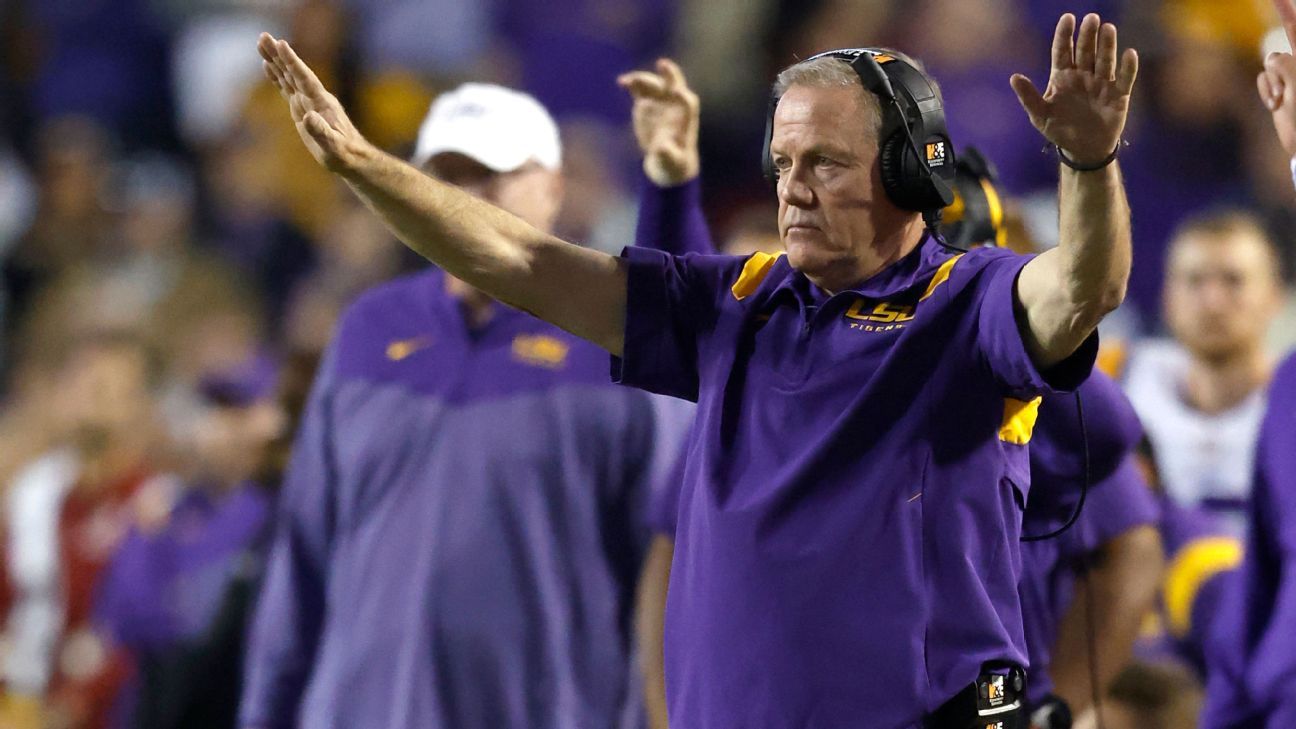
BATON ROUGE, La. — LSU coach Brian Kelly said that he has encouraged the SEC to adopt headset communication but that his efforts have ultimately gone nowhere.
Kelly is frustrated that they can’t use the technology, which is readily available and would effectively eliminate the practice of stealing signs.
“It’s silly,” he told ESPN on Wednesday. “Silly meaning my genuine feeling is that we have too many smart people that have looked at this and said we should be doing it and we haven’t taken the time to actually move it forward.”
Kelly said that teams attempting to steal signals of opponents has been “going on forever.”
Asked whether those efforts ever rose to the level of what Michigan is accused of, sending people to scout opponents in person and using recording devices, Kelly said, “Who knows.”
“But this isn’t the first time we’ve heard of sign stealing,” he said, “whether there is proposed sign stealing or people were buying tickets to other games. This is all part of why this should not even be part of the equation.”
Kelly said the tangible effect of stealing signals is debatable. In 32 years of coaching, he said, he has never believed they lost a game because of it.
“I’ve never come back to the office and go, they got us,” he added.
Administrators have raised concerns that headset communication like the kind used in the NFL would void the warranties of helmets. There’s also the consideration of cost and implementation. Officials would have to employ someone to turn off the communication devices before each play as well.
But, as Kelly said, “I just don’t see why not.”
A longtime official told ESPN’s Adam Rittenberg that the excuses don’t merit not using the devices.
“If you want to clean up what’s going on at Michigan and every other school, put a transmitter,” the official said. “The NCAA talks about losing the warranties on the helmets. With the USFL, XFL, NFL, with transmitters, it does not lose the warranty. I don’t care what it costs, we want it. Clean up the game, make it more professional. It’s just technology.”
Todd Berry, the executive director of the American Football Coaches Association, is also in favor.
“This is too easy a problem to solve,” he said.
During the summer, the NCAA Rules Committee approved the experimental use of in-game communication technology in bowl games, National Coordinator of Officials Steve Shaw told ESPN. College Football Playoff games will not be impacted.
Shaw said that both schools and their conference offices will have to agree on the parameters for use. Headset communication like that used by the NFL could be used, as well as wearable technology similar to PitchCom, which is used in baseball.
The experiments would inform the expected debate in February 2024 when the NCAA will meet and consider rule changes.
Arkansas coach Sam Pittman said that he’s “all for it” and that it would “take some of that out of the game and make sure that it’s all fair.”
“You can’t steal signs and do any of this stuff if you have a helmet communicator,” said Alabama coach Nick Saban.
Florida State coach Mike Norvell said that sign stealing has been going on “forever” and that the staff does an “elaborate job of how we communicate” to avoid it.
“Accusations of people going and watching games,” he said, “that’s just an unethical thing. It’s against all parts of the rules and what’s stated. So I can’t defend that.”












